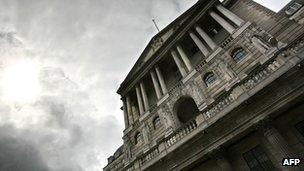Funding for Lending: Banks sign up to new scheme
- Published

The Bank of England started the scheme last month
Five of the UK's six biggest lenders have signed up to the Funding for Lending scheme, designed to stimulate the economy by making cheaper loans available to firms and individuals.
HSBC is the only one of the top six not taking part, as it says it does not need additional funding.
The Bank of England, which runs the scheme, said 13 banks and building societies had signed up so far.
They represent 73% of the market and £1.2 trillion worth of lending.
The institutions can borrow the equivalent of up to 5% of their loan books immediately, and more if they meet certain conditions over the next year.
Based on their current lending levels, the 13 institutions could initially draw on up to £60bn of Bank of England funding.
Paul Fisher, the Bank of England's executive director for markets, said , externalthat a "significant number" of other banks and building societies were close to signing up.
"I am confident that the FLS [Funding for Lending Scheme] will help the supply of credit," he said.
"Before its introduction, it was more likely than not that the stock of credit would contract further over the next 18 months," he said.
'Confidence boost'
The funding has been available since last month, but this is the first time the Bank has revealed the names of the institutions taking part.
The banks and building societies that have signed up are: Aldermore, Barclays, Hinckley & Rugby Building Society, Ipswich Building Society, Kleinwort Benson, Leeds Building Society, Lloyds Banking Group, Monmouthshire Building Society, Nationwide Building Society, Principality Building Society, RBS Group, Santander and Virgin Money.
Royal Bank of Scotland, majority-owned by the taxpayer, confirmed that it had already made £1bn of discounted loans, after launching the scheme on 1 August.
It said it had cut interest rates by up to 1.7 percentage points, saving small and medium-sized businesses £20m.
"We hope this gives more businesses the confidence they need to invest," said Chris Sullivan, chief executive of RBS Corporate Banking.
Only six of the UK's 47 building societies have so far signed up.
The Building Societies Association said it was confident that more would sign up but the process was complex.
Mortgage broker Ray Boulger said: "The smaller building societies, in particular, may struggle with the rather large amount of paper work they have to complete before they qualify for these funds.
"I do think over the next few months we will see a lot more building societies take up these funds," he told the BBC.
'No spark'
The scheme aims to make cheaper funds available to existing institutions and encourage new ones to enter the market.
The continuing financial crisis and fears about the fate of the eurozone have hit banks' access to funding on the open markets, making it more difficult and more expensive to borrow.
Banks that rely on the markets, rather than savers' deposits, for the money they lend out have been passing on these higher costs to business and mortgage customers. The terms and conditions have also been getting stricter.
Before the launch of the scheme, loan rates were expected to rise further, Mr Fisher pointed out.
"Central banks should not normally have to intervene to provide banks with medium-term funding at reasonable spreads. But enough was enough!
"The FLS will not address any of the underlying problems in the euro area or in the financial sector, but given that many of those problems are outside the UK's direct control, it became necessary for us to do something innovative," he told an audience at the American International University in London.
Some loan rates have fallen since the scheme was announced.
But assessing whether the scheme is a success will not be straightforward, Mr Fisher said.
"What matters is whether policy makes the outcome better than it would otherwise have been - but that alternative reality - the 'counterfactual' in economic speak - is always a matter of conjecture and debate.
"Nevertheless, I believe the scheme provides all the right incentives to increase the supply of credit."
Stone Ventures, which invests in small and medium-sized businesses, said it doubted that Funding for Lending would "reignite" the business loans sector.
"Sparking the economy back into life with cheap money is like trying to light a damp pile of kindling with a soggy box of matches," said founder Stewart Baird.
"Cheap money alone will not spark growth. Money in the right places will.
"You can bet your bottom dollar that the smallest companies with the highest growth potential aren't seeing any of this money. The banks remain intensely, almost pathologically, risk-averse," Mr Baird said.
- Published24 September 2012
- Published24 September 2012
- Published24 September 2012
- Published19 September 2012